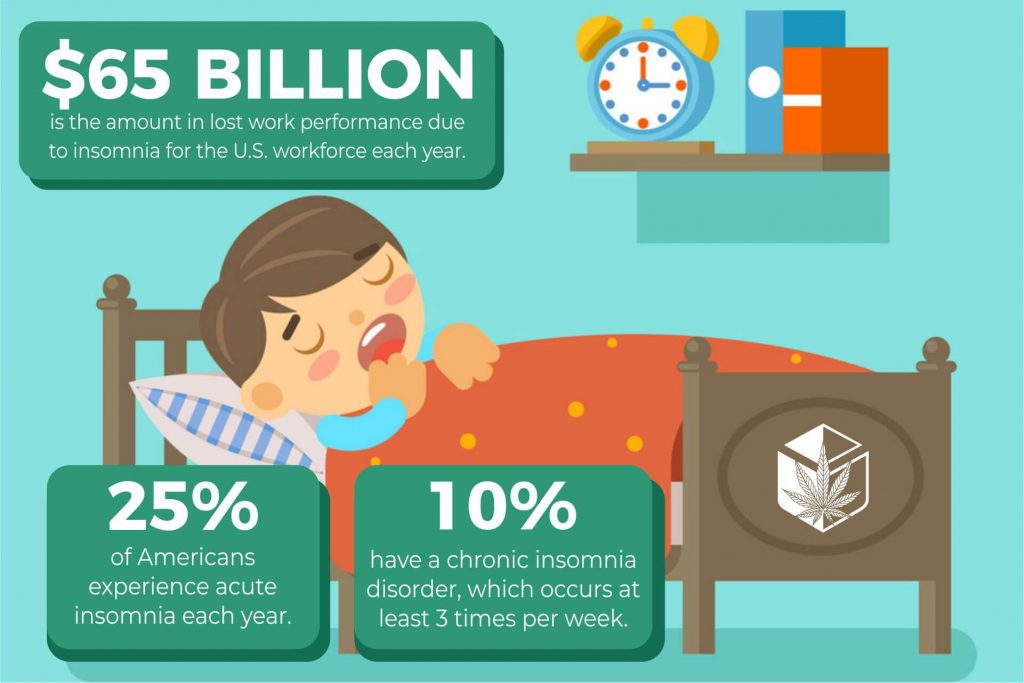CBD for Sleep and Insomnia
In this guide, I will try to answer some commonly asked questions about CBD and sleep. Like is there a relationship at all or these are all myths without proven facts? Read on:
One of the very common health issues faced by a huge majority of Americans today is sleeplessness. Not only do a compelling number of people find it difficult to fall asleep, but also to stay asleep for long. The quantity and quality of sleep both are a matter of concern today.
The severity of the problem can be comprehended from research by the University of Toledo and Ball State University. The study points out that in every 3 Americans, more than one is sleep deprived. A majority is not getting the recommended 7 hours of sleep.

Where this lack of sleep might be a symptom of many underlying problems, it is also a cause of serious health issues. Prolonged sleeplessness or poor quality sleep can cause diabetes, heart problems, high blood pressure, and even premature death. It is also a leading cause of reduced attention span and lower productivity in adults at the job.
One of the most relied upon solutions for lack of sleep is conventional sleep aids i.e. sleep-inducing pills. However, the problem with these pills is that majority of them are addictive. Moreover, they cause a number of side serious side effects in the long run. That is the reason natural remedies like CBD have become suddenly popular against sleep issues. Before you decide whether it is worth a try, let us first explore what CBD is and how it helps cope with sleeplessness.
What is CBD?
CBD, or cannabidiol, is a phytocannabinoid. Simply put, it is a plant-based cannabinoid compound derived mostly from the hemp plant. Cannabinoids are known for a variety of health benefits for the human body. However, CBD differs from the majority of other cannabinoids. Unlike other cannabinoids like THC, it does not create a high. This non-psychoactive nature makes CBD one of the most desirable cannabinoids. It offers all the benefits associated with cannabinoids without giving you a stoned feeling.
Although both hemp and marijuana plants contain CBD, it is mostly derived from hemp because marijuana also contains high concentrations of THC. Whereas, hemp only contains minimal or no traces of THC.
How CBD works Against Sleeplessness?
Although the research related to the efficacy of CBD in inducing sleep is still in the initial stage, some promising results are observed by the researchers so far. For example, a recent case study suggests that CBD is effective in treating short-term sleep problems. It does so both by directly affecting the sleep-wake cycle and by indirectly inducing sleep by easing the stimuli behind the lack of sleep. Here is how CBD works to help cope with sleep deprivation;

- CBD affects the endocannabinoid system, ECS found in humans. This system has a wide network of receptors throughout the body and it works by releasing endocannabinoid compounds in the body. Researchers suggest that CBD works in the same way as the body’s natural cannabinoids.
Besides other receptors, CBD is found to interact with the receptors that control the sleep-wake cycle in the body. Hence the studies suggest that it has a profound and direct effect on the quality and quantity of sleep.
- Besides, its effect on the receptors which control anxiety is established through various researches. By reducing the anxiety level, controlling mood, and easing depression, CBD helps in a very natural way to induce quality sleep.
- Moreover, it is a powerful pain killer and anti-inflammatory agent. Thus, the lack of sleep resulting from pain and inflammation can be effectively treated with the use of CBD. It has been established through comprehensive research that CBD can effectively control the chronic pain resulting from a variety of underlying health issues. Thus, one of the common reasons for sleeplessness can be controlled through this natural compound.
Above all, the researchers have found that CBD can significantly aid in the quality of sleep during the REM stage. It can thus play a vital role in treating REM sleep disorders. The research shows that CBD-based supplements can significantly increase the time spent in the REM stage of sleep. Hence it not only helps fall asleep but also helps to stay asleep for a longer time. Moreover, the same study suggests that the use of CBD does not result in any toxic results in the consumers, unlike most of the conventional sleep inducers.
Dosage and Administration of CBD
The potency, number of doses, the time of taking CBD, the form in which it is administered, and the daily routine accompanying the dosage can have a significant effect on how effective CBD is in improving sleep.

- When it comes to the recommended dosage of CBD-based supplements for sleep, thorough research is still lacking. However, some initial studies strongly suggest that the higher dosage will be more effective. Lower dosage e.g. 25 mg or less may not show the desired results. Some studies suggest that a reasonable dose of CBD would be around 160 mg for the results to be evident and speedy.
However, it is recommended that you start with a smaller dose. Starting with 30mg, according to Mitch Earlywine, a professor of psychology at the University of Albany, would be ideal. Then you should progressively increase the dose until it starts working for you.
- Moreover, when it comes to duration of use, it is mostly suggested that you rely on CBD for short periods of time. I.e. do not use it continuously for longer periods of time. It is better to avoid its daily use. Besides, use it for a month or so and take a break. Using CBD daily or multiple times a day for longer periods may reduce its efficacy in the long run.
- The form of administration i.e. the form in which CBD is consumed is a significant factor in deciding the outcome. it not only affects the degree of efficacy but also the time required for CBD to start showing results. For example, when used in the form of vape juice in electronic cigarettes, the results will be quicker i.e. you will fall asleep quickly. However, when used in the form of gummies, oils, tinctures, or capsules, results would be long term i.e. it will increase the duration of sleep. This is because pure vapor of CBD will be absorbed quickly in your bloodstream while the other forms release CBD slowly in the system and hence take longer. This results in a longer period of uninterrupted sleep.
- Moreover, always take into consideration the brand you are buying. This is important because those who do not mention a complete list of contents on the label must not be relied on. They might not be authentic or even safe. Always go for the product which has a list of ingredients clearly mentioned on the label along with percentages for each. This is particularly important when you want to avoid THC because you do not want to get a feeling of high. Although small quantities of THC e.g. 0.3%, can actually help CBD work better, most people avoid THC because they do not want to get a stoned feeling. Products that do not mention THC content are not the safest to rely upon.
- It is advisable to take CBD at least an hour before you go to bed. Moreover, CBD oil when used under the tongue should be helpful for at least 90 seconds for it to be effective.
- Moreover, you need to bring some changes to your daily routine for any sleep inducer to be effective. CBD I, not an exception. For example, you must not take a caffeine-based product at least an hour before your bedtime. Moreover, you must include some physical activity in your daily routine for a healthy sleep schedule to set in. This may include an exercise or a walk. However, this too should be avoided immediately before bed.

Potential Side Effects of CBD-Based Sleep Inducers
CBD-based sleep inducers have an edge over other over-the-counter pills because the former is not addictive. Moreover, they do not have any serious or long-term side effects. However, under specific conditions, CBD might have some side effects for some people;
- It can cause dizziness and fatigue in some people, especially when used for longer periods.
- Those who are already taking certain medicines must not use CBD without consulting a physician. This is because CBD can interfere with other medications and may result in adverse effects.
- Moreover, some people may suffer from diarrhea when they start using CBD. Start with a smaller dose and slowly increase it. If it still causes diarrhea, stop using it.
Loss of appetite is another possible side effect of CBD.
Conclusion
CBD and Sleep – CBD does show promising results after some initial research when it comes to managing sleep. The prospects are really positive, however, it is still recommended that you do not rely on any over-the-counter medication before consulting your doctor because the same product may affect individuals differently. Moreover, starting with smaller dosages and waiting for a couple of days before taking the second dose is also recommended to be on the safer side.
References
https://link.springer.com/article/10.1007/s10900-019-00731-9
https://www.ncbi.nlm.nih.gov/pmc/articles/PMC6326553/
https://pubmed.ncbi.nlm.nih.gov/28349316/
https://www.ncbi.nlm.nih.gov/pmc/articles/PMC4851925/
https://thecbdinsider.com/health/cant-fall-asleep-cbd-can-help/#cbd-treats





